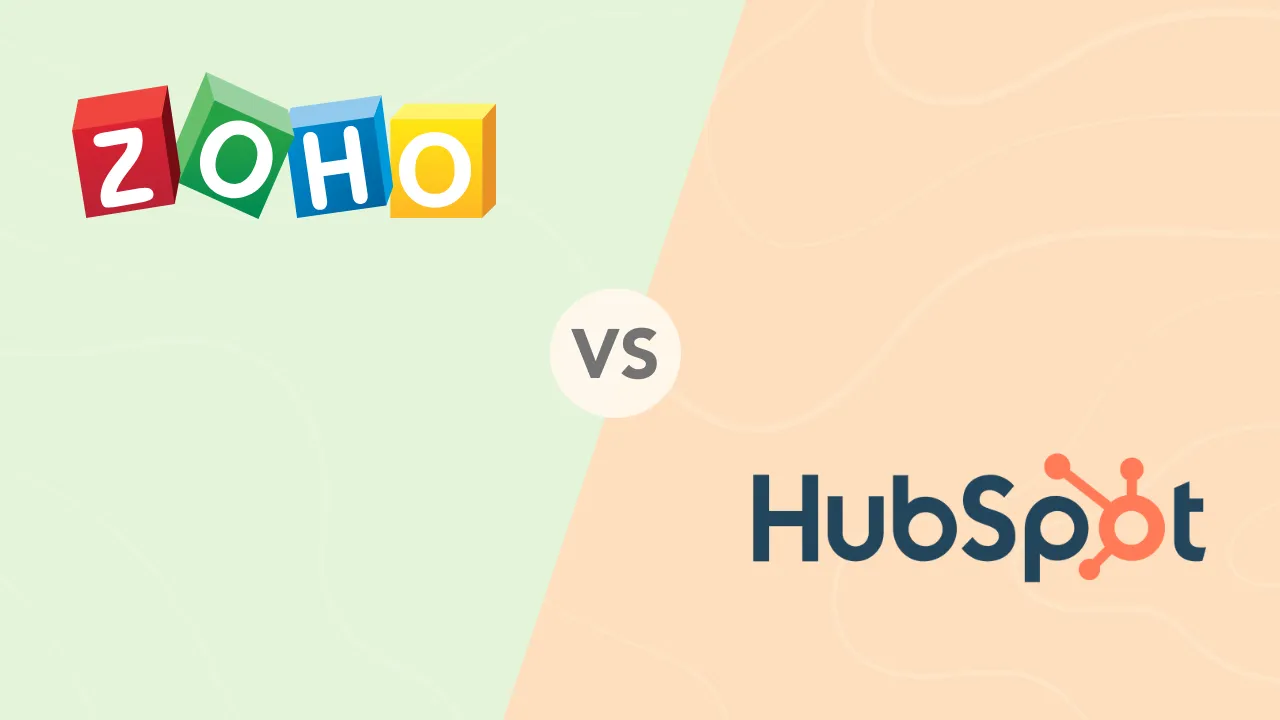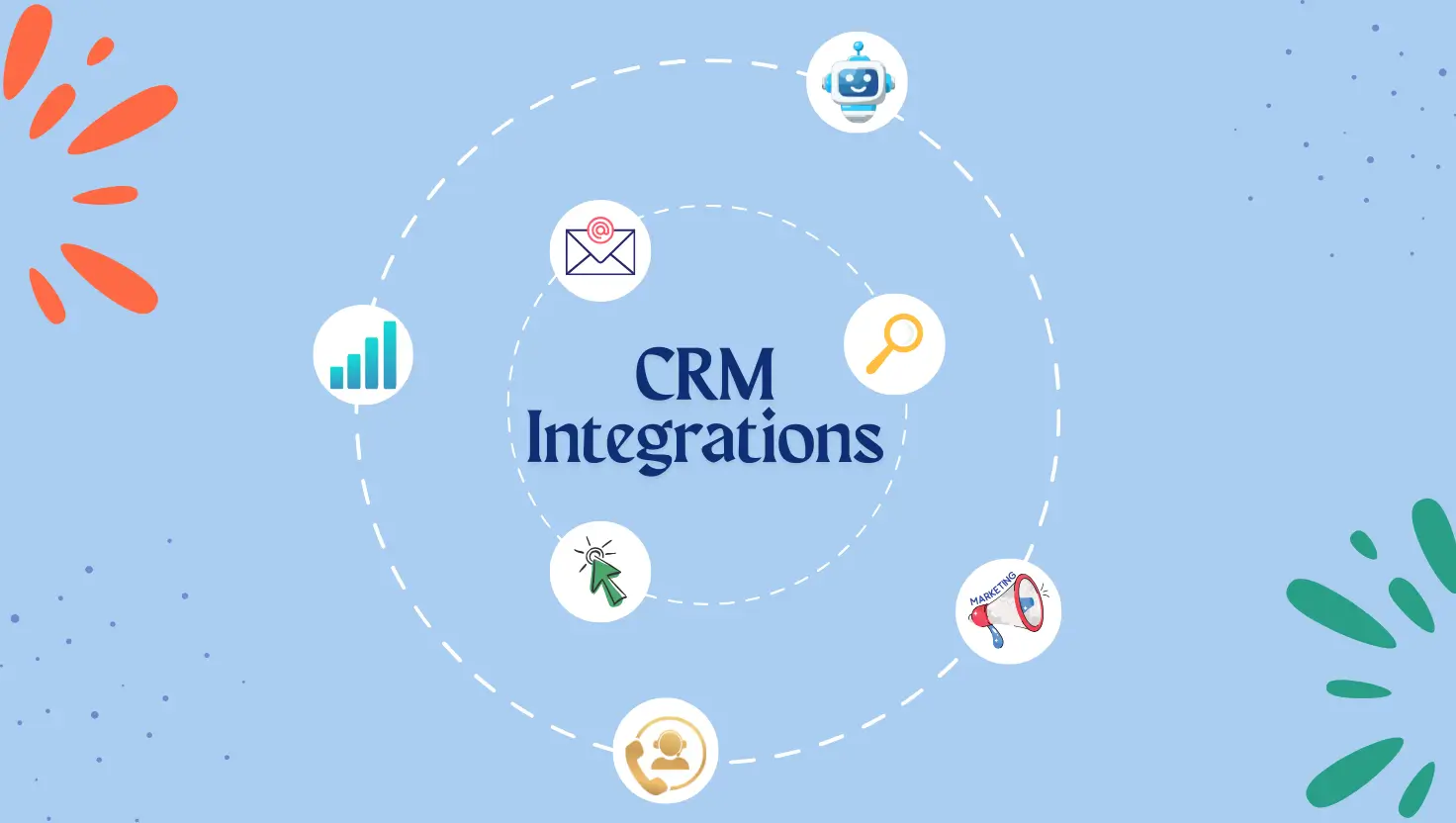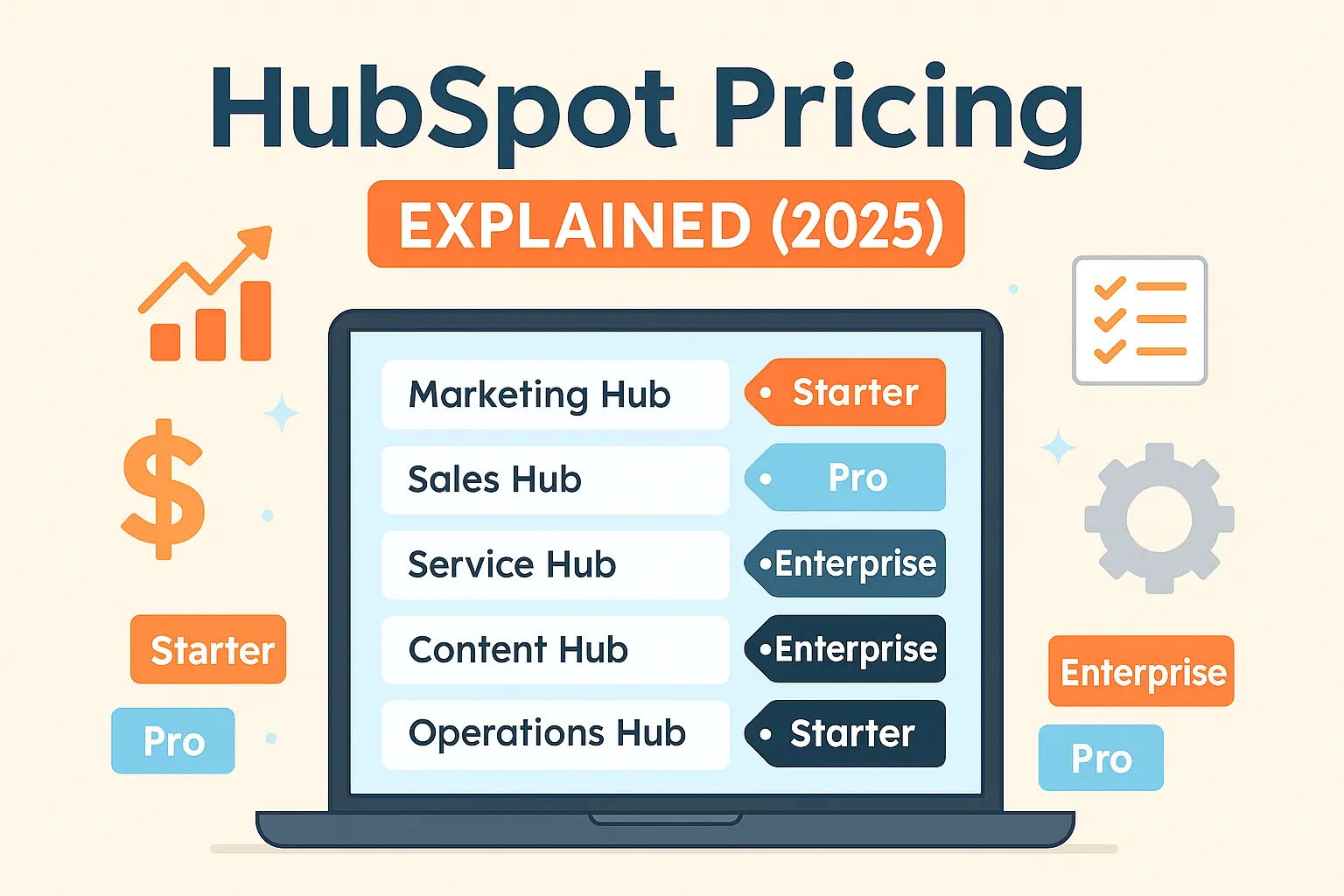Best CRM Software for 2025
Last updated: September 2025
For small and mid-sized businesses, managing customer relationships effectively is key to growth, and the right CRM software makes it easier to stay organized, close more deals, and build stronger connections. From tracking leads and automating follow-ups to managing sales pipelines and syncing with marketing tools, a CRM system can streamline your entire customer lifecycle.
- Sync emails to track client interactions
- Import leads with integrations
- No-code automation
- Unified platform for sales and marketing
- Track customer interactions in real time
- Customizable dashboards and reports
- Mobile app means you never miss a sale
- 300+ integrations enhance functionality
- Automate your entire sales process
- Track contacts & manage sales pipeline
- Get a complete view of every customer
- Einstein GPT boosts customer interactions
- Simple payments, contracts, and tasks
- Track progress with smart dashboards
- Smooth integrations: Quickbooks and more
- One of the easiest CRM to use
- Take action with real-time tracking
- Easy built-in communication tools
- InfoFlo integrates seamlessly with Outlook
- Trusted by over 20,000 companies
- Complete VoIP phone and SMS integration
- Automates the lead-to cash process
- Built to increase productivity all-around
- Forecasting & upsell made easy
- Increase sales with multichannel software
- In-depth analytics to track success
- Premium customer support
- One place for company-wide collaboration
- Real-time reporting
- 24/7 support

monday CRM, HubSpot CRM, Pipedrive and Salesforce rank among the best CRM software in 2025, each excelling for different business needs: monday for customizable, project‑centric workflows; HubSpot for free tools and marketing integration; Pipedrive for intuitive sales pipeline management; and Salesforce for AI‑driven enterprise scalability. According to Sonary’s evaluation across 30+ criteria, these platforms offer top‑tier automation, integrations, and user experience, making them the leading choices depending on your team’s size and sales strategy
We reviewed several top-rated CRM platforms, including options like monday.com, HubSpot, Pipedrive, and Salesforce, and evaluated them across 30+ key criteria, from ease of use and pricing to automation, integrations, and mobile access. Each stands out for a different reason, whether AI-powered insights, visual sales pipelines, or seamless email tracking.
Some of the best CRM tools for small businesses start at $0 to $14 per user per month, while full-featured platforms like Salesforce and HoneyBook range from $25 to $30+ per user, depending on your business needs. No matter your team size or sales process, there’s a CRM here designed to help you work smarter.
In this guide, we compare the top CRM software solutions, highlighting pricing, standout features, and best use cases, so you can confidently choose the right one to grow your business.
List of The Top CRM Solutions:
Here are our top picks for CRM platforms for SMBs and growing companies looking for powerful tools, flexible plans, and affordable options:
- monday CRM – Best for customizable CRM with project management.
- HubSpot CRM – Best for small businesses needing a free CRM tool that scales.
- Pipedrive – Best for sales teams managing visual pipelines.
- Salesforce – Best for enterprises needing automation and AI-driven CRM.
- HoneyBook – Best for freelancers handling client communication and invoicing.
- Freshsales – Best for AI-powered lead scoring and sales tools.
- InfoFlo – Best for small businesses wanting offline CRM with one-time pricing.
- Oracle NetSuite CRM – Best for enterprises needing ERP-integrated CRM and analytics.
- Zoho CRM – Best for budget-friendly CRM with automation.
- ClickUp – Best for teams combining CRM with project management.
What Is CRM Software?
CRM (Customer Relationship Management) software helps businesses organize customer data, track interactions, and automate workflows across sales, marketing, and support teams. By centralizing communications and automating repetitive tasks, CRM tools improve team productivity and customer experience (CX).
Key benefits include:
- Better lead management
- Streamlined sales pipelines
- Advanced reporting and analytics
- Personalized marketing automation
- Unified customer service tracking
Also known as: client management systems, sales CRMs, contact databases, customer data platforms (CDPs)
Quick Comparison Table: Best CRM Tools in 2025
| CRM Platform | Best For | AI Features | Custom Dashboards | Integrations | Free Plan |
| monday sales CRM | Small to mid teams | ❌ (rules-based only) | ✅ Highly visual UI | 200+ (Slack, Gmail, etc.) | ✅ |
| HubSpot CRM | Startups | ✅ AI recommendations | ✅ Drag-and-drop pipelines | 1,400+ (incl. Salesforce, Zapier) | ✅ |
| Pipedrive | Small to mid teams | ✅ Sales Assistant | ✅ Deal tracking | 300+ | ❌ |
| Salesforce Sales Cloud | Large enterprises | ✅ Einstein AI | ✅ Fully customizable | 3,000+ via AppExchange | ❌ |
| HoneyBook | Freelancers, small services | ❌ (basic workflows) | ✅ Client-based tracking | Limited native + Zapier | ✅ |
| Freshsales | All-in-one sales | ✅ Freddy AI | ✅ Revenue insights | 100+ | ✅ |
| InfoFlo CRM | Local businesses | ❌ | ✅ Desktop UI | Very limited (Outlook, QuickBooks) | ❌ |
| Oracle NetSuite CRM | Enterprise | ✅ Predictive AI | ✅ Executive dashboards | limited | ❌ |
| Zoho CRM | SMBs | ✅ Zia AI | ✅ Custom modules | 500+ integrations | ✅ |
| ClickUp | Hybrid task/ workflows | ❌ (automation only) | ✅ CRM-style views | 100+ (native & Zapier) | ✅ |
Top 10 Best CRM Software Platforms
Here’s a closer look at each CRM, highlighting why they’re considered the best CRMs for different business types:
monday sales CRM: Best for Visual Sales & Project Management
 Sync emails to track client interactions
Sync emails to track client interactions  Import leads with integrations
Import leads with integrations -
Overview: A highly customizable CRM that integrates project management with sales workflows.
-
User Benefits:
-
Visual dashboards make it easy to track sales progress.
-
Automation reduces repetitive tasks, saving time.
-
Flexible customization fits various business models.
-
- Benefit: Enhances team collaboration and project tracking.
- Trial/Free Plan: Available
- Practical Example: A marketing agency can use Monday CRM to manage client projects while tracking leads in the same platform.
HubSpot CRM: Best Free CRM with Growth Potential
 Unified platform for sales and marketing
Unified platform for sales and marketing  Track customer interactions in real time
Track customer interactions in real time - Overview: A popular free CRM solution ideal for small to mid-sized businesses.
- User Benefits:
-
Centralizes contact management and sales pipeline tracking.
-
Free tools for email marketing and customer engagement.
-
Its intuitive interface simplifies sales management, making it easier for teams to handle sales processes efficiently.
-
Integrates seamlessly with HubSpot’s marketing and service hubs.
-
- Benefit: Helps businesses scale without immediate investment.
- Trial/Free Plan: Yes – generous free CRM tool tier
- Practical Example: A startup can use HubSpot CRM’s free tier to manage its growing customer base without incurring costs.
Pipedrive: Best for Sales-Only Teams
 Mobile app means you never miss a sale
Mobile app means you never miss a sale  300+ integrations enhance functionality
300+ integrations enhance functionality -
Overview: A sales-focused CRM designed to streamline the sales pipeline.
-
User Benefits:
-
Visual pipeline makes lead tracking intuitive.
-
Automation features help follow up on leads effectively.
-
Strong reporting tools for performance tracking.
-
- Benefit: Increases sales team efficiency with focused workflows.
- Trial/Free Plan: 14-day free trial available
- Practical Example: A B2B sales team can use Pipedrive to manage complex sales cycles and prioritize hot leads.
Salesforce: Best for large enterprises and scalability
 Track contacts & manage sales pipeline
Track contacts & manage sales pipeline  Get a complete view of every customer
Get a complete view of every customer -
Overview: A comprehensive CRM platform known for its scalability and extensive features.
-
User Benefits:
-
Powerful automation and AI tools (Einstein AI) for lead scoring and forecasting. Salesforce leverages advanced CRM technology, including AI-driven insights, to enhance lead scoring and forecasting.
-
Highly customizable to fit any industry.
-
Large ecosystem of integrations and apps.
-
- Benefit: Enables global sales teams to collaborate efficiently.
- Trial/Free Plan: 30-day free trial available
- Practical Example: A large enterprise can use Salesforce to manage global sales teams and customer data across regions.
Related Articles
HoneyBook: Best CRM for Freelancers
 Simple payments, contracts, and tasks
Simple payments, contracts, and tasks  Track progress with smart dashboards
Track progress with smart dashboards -
Overview: A CRM tailored for freelancers and service-based businesses.
-
User Benefits:
-
Combines project management with client communication.
-
Streamlines invoicing and payment collection.
-
Easy-to-use templates for contracts and proposals.
-
- Benefit: Simplifies client management for service professionals.
- Trial/Free Plan: 7-day free trial
- Practical Example: A wedding planner can manage client bookings, contracts, and payments all within HoneyBook.
Freshsales: Best All-in-One CRM for SMBs
 One of the easiest CRM to use
One of the easiest CRM to use  Take action with real-time tracking
Take action with real-time tracking -
Overview: A user-friendly CRM focusing on sales automation and lead management.
-
User Benefits:
-
AI-driven lead scoring prioritizes high-value prospects.
-
Integrated phone and email features streamline communication.
-
Strong reporting tools for sales analysis.
-
- Benefit: Improves lead conversion rates through smart automation.
- Trial/Free Plan: Yes – offers a free CRM tool plan
- Practical Example: A SaaS company can use Freshsales to manage its sales funnel and improve conversion rates.
InfoFlo: Best for Simple, One-Time Payment CRM
 InfoFlo integrates seamlessly with Outlook
InfoFlo integrates seamlessly with Outlook  Trusted by over 20,000 companies
Trusted by over 20,000 companies -
Overview: A simple, cost-effective CRM with a one-time purchase fee.
-
User Benefits:
-
No recurring subscription fees.
-
Offline access to customer data.
-
Basic contact management and document sharing.
-
- Benefit: Provides an affordable solution for small businesses.
- Trial/Free Plan: No subscription required
- Practical Example: A small consulting firm can use InfoFlo to manage client contacts and project files without ongoing costs.
Oracle NetSuite CRM: Best for Enterprise-Level CRM and ERP
 Automates the lead-to cash process
Automates the lead-to cash process  Built to increase productivity all-around
Built to increase productivity all-around -
Overview: An enterprise-level CRM with strong ERP integration.
-
User Benefits:
-
Unified platform for sales, marketing, and ERP functions.
-
Advanced reporting and analytics.
-
Highly scalable for large organizations.
-
- Benefit: Supports complex business processes with integrated tools.
- Trial/Free Plan: On request
- Practical Example: A multinational corporation can use NetSuite to manage global operations and sales pipelines.
Zoho CRM: Best Budget CRM with AI
 Increase sales with multichannel software
Increase sales with multichannel software  In-depth analytics to track success
In-depth analytics to track success -
Overview: A versatile and affordable CRM for small to mid-sized businesses.
-
User Benefits:
-
Extensive automation options and AI-powered tools.
-
Omnichannel communication capabilities.
-
Highly customizable with numerous integrations.
-
- Benefit: Delivers enterprise-level features at an SMB price.
- Trial/Free Plan: Yes – free CRM tool available
- Practical Example: A real estate agency can use Zoho CRM to manage property listings, client interactions, and marketing campaigns.
ClickUp: Best for CRM Integration
 One place for company-wide collaboration
One place for company-wide collaboration  Real-time reporting
Real-time reporting -
Overview: A multi-functional tool that combines project management and CRM capabilities.
-
User Benefits:
-
Customizable pipelines for sales tracking.
-
Integrated task and project management.
-
Automation features streamline workflows.
-
- Benefit: Combines project management and CRM in a single platform.
- Trial/Free Plan: Yes
- Practical Example: A software development team can use ClickUp to manage client projects and sales leads in a single platform.
How to Choose the Right CRM for Your Business
1. Identify Your Business Needs
Every business has unique processes and customer engagement strategies. Determine whether you need a CRM for sales automation, customer support, marketing, or an all-in-one solution that includes robust sales management features.
2. Assess Scalability and Flexibility
Choose a CRM that can grow with your business. Look for platforms that offer scalable plans and customization options to fit your evolving needs.
3. Evaluate Usability and User Experience
An intuitive interface and ease of use can reduce the learning curve and enhance productivity. Opt for a CRM that your team can quickly adopt.
4. Integration Capabilities
Ensure the CRM integrates seamlessly with your existing tools, such as email marketing software, accounting tools, or e-commerce platforms.
5. Consider Pricing and ROI
Compare the cost of each platform, paying close attention to trials and free plans. Some offer incredible value with no upfront investment.
6. Read User Reviews and Testimonials
Look for reviews and case studies that highlight real-world use cases. These can provide insight into potential challenges and benefits.
Benefits of Using CRM Software
- Improved Customer Relationships
- Increased Sales Productivity
- Enhanced Collaboration
- Data-Driven Insights
- Scalability for SMBs and Enterprises
- Cost Savings through Automation
Cost Savings
Implementing a CRM system can lead to significant cost savings for businesses. By automating manual tasks and streamlining processes, businesses can reduce the time and resources spent on administrative tasks. This increased efficiency allows teams to focus on more strategic activities, such as developing new sales strategies or improving customer service. The reduction in manual workload not only saves time but also minimizes the risk of errors, leading to more accurate and reliable customer data management. Ultimately, a CRM system can help businesses operate more cost-effectively and achieve better financial performance.
Increasing Productivity with AI
CRM software can also increase productivity with the help of Artificial Intelligence (AI). AI-powered CRM tools can automate tasks such as data entry, lead scoring, and customer segmentation. This automation frees up sales teams to focus on high-value activities, such as building relationships and closing deals. For example, AI can analyze customer interactions to identify the most promising leads, allowing sales reps to prioritize their efforts more effectively. Additionally, AI-driven insights can help businesses tailor their marketing and sales strategies to better meet customer needs, further enhancing productivity and driving growth.
Key Features of a CRM
A CRM system typically includes a range of features that enable businesses to manage customer relationships effectively. Some of the key features of a CRM include:
- Contact Management: This feature allows businesses to store and manage customer contact information in one place, ensuring easy access and organization.
- Sales Pipeline Management: This feature enables businesses to track the progress of sales leads through the sales process, providing a clear view of the sales pipeline.
- Marketing Automation: This feature allows businesses to automate marketing campaigns and track their effectiveness, helping to optimize marketing efforts.
- Customer Service and Support: This feature enables businesses to manage customer service requests and provide support to customers, ensuring timely and effective resolution of issues.
- Project Management Features: This feature allows businesses to manage projects and tasks associated with each lead and client, ensuring that all activities are aligned and on track.
- Workflow Automation: This feature enables businesses to automate repetitive tasks and streamline processes, improving efficiency and reducing manual workload.
- Repeat Customers: This feature allows businesses to track and manage repeat customers, providing personalized service and fostering customer loyalty.
- CRM Features: This feature enables businesses to customize the CRM system to meet their specific needs, ensuring that the system aligns with their unique processes and requirements.
- Customer Support: This feature enables businesses to provide support to customers and manage customer service requests, ensuring high levels of customer satisfaction.
- Project Management Features: This feature allows businesses to manage projects and tasks associated with each lead and client, ensuring that all activities are aligned and on track.
- Streamline Processes: This feature enables businesses to streamline processes and automate tasks, improving overall efficiency and productivity.
- Automate Processes: This feature enables businesses to automate repetitive tasks and streamline processes, reducing manual workload and increasing efficiency.
By implementing a CRM system, businesses can improve their customer relationships, increase productivity, and drive revenue growth. A well-chosen CRM platform can transform how a business operates, making it more efficient, responsive, and customer-focused.
Cloud CRM vs. On-Premise CRM
| Feature | Cloud CRM | On-Premise CRM |
| Accessibility | Anywhere with internet | Limited to internal networks |
| Cost | Subscription-based (predictable) | One-time license, higher upfront cost |
| Maintenance | Handled by provider | Requires internal IT |
| Best for | SMBs, remote teams | Enterprises with custom IT needs |
Industry-Specific CRM Solutions for Sales Management
- Retail CRM: Focuses on customer loyalty programs, purchase history tracking, and personalized marketing.
- Real Estate CRM: Includes property management features, client matching, and transaction tracking.
- Healthcare CRM: Manages patient interactions, appointment scheduling, and follow-up care.
- Financial Services CRM: Handles client portfolios, compliance tracking, and financial planning.
CRM Implementation Tips: How to Set Up for Success
Successfully implementing a CRM system goes beyond just installing software; it’s about aligning your people, processes, and tools. Follow these expert-backed tips to ensure smooth adoption and long-term impact:
1. Map Your Sales Process First
Before setting up your CRM, define each stage of your sales cycle, from lead capture to closed-won. This ensures your pipeline reflects how your team actually sells, not a generic template.
2. Configure Custom Fields & Deal Stages
Tailor the CRM to your business by adding custom fields (e.g., industry, deal value, source) and renaming stages like “Qualified,” “Proposal Sent,” or “Negotiation.” This makes tracking leads and forecasting revenue more accurate.
3. Import Only Clean, Sales-Ready Data
Don’t just bulk upload old spreadsheets. Scrub your contacts list, remove duplicates, tag lead sources, and map the data to the correct fields in your CRM (like contacts, companies, or deals).
4. Automate Follow-Ups & Task Reminders
Use your CRM’s workflow builder to trigger reminders, email sequences, or rep assignments based on pipeline changes, for example, sending a follow-up email 3 days after a demo.
5. Set Up Lead Scoring & Routing
Assign points to leads based on behavior (downloads, form fills, replies) and profile (job title, company size). Route high-intent leads to the right sales rep automatically to reduce delay.
6. Train for Daily Use, Not Just Features
Show your team how to log calls, move deals, and track emails within the CRM. Focus on real scenarios, like “How to know which leads to call today” or “How to update deal probability.”
7. Monitor CRM Adoption & Sales KPIs Weekly
Use the CRM’s reporting tools to track rep activity (calls, emails, tasks), lead engagement, deal velocity, and pipeline health. Tweak your workflows monthly based on what the data tells you.
Final Thoughts
The most popular and best CRM software platforms today deliver a full range of features, from automation and lead scoring to integrated document management systems (DMS) and real-time analytics. Whether you need a free CRM tool, a budget-friendly plan, or a scalable enterprise solution, there’s the best option for most small businesses in this guide.
Don’t just pick the most well-known name, choose the platform that aligns with your workflows, budget, and long-term growth plans.
Why You Can Trust the Expertise of Sonary
At Sonary, we are committed to providing accurate and trustworthy information to help you make informed decisions. Our research process is meticulous, transparent, and guided by a dedication to maintaining the highest standards of integrity, ensuring accurate, real-world insights.
Read more
Unlike many other review platforms, we conduct in-depth evaluations of the software and services we feature. Our expert team tests and actively uses the tools we review to understand their features, performance, and value comprehensively. Our assessments are based on real-world use, giving you insights beyond surface-level descriptions. Our research methodology includes analyzing key consumer factors such as pricing, functionality, device usability, scalability, customer support quality, and unique industry-specific features. This hands-on approach and dedication to transparency mean you can trust Sonary to deliver regular, up-to-date content and recommendations that are well-researched and genuinely helpful for your business needs.Frequently Asked Questions (FAQs)
1. What is CRM software?
CRM software helps businesses manage customer relationships, sales processes, and interactions to improve customer retention and drive growth.
2. What CRM is best for small businesses?
HubSpot, Zoho, and Freshsales are ideal thanks to their free plans, automation, and ease of use.
3. Who should use CRM software?
CRM software can benefit businesses of all sizes, from freelancers to large enterprises, by streamlining customer management, boosting sales, and improving communication.
4. Does CRM include phone, chat, and email?
Yes. Freshsales offers all-in-one communication tools within its CRM.
5. What’s the most customizable CRM?
Salesforce offers the highest degree of customization through AppExchange and API access.
6. Can I switch CRMs later?
Yes, most CRMs allow data export/import and offer onboarding support to migrate your data.
7. What is the difference between cloud CRM and on-premise CRM?
Cloud CRM is hosted online and accessible from anywhere, while on-premise CRM is installed locally and offers more control but requires in-house maintenance.
8. How much does CRM software cost?
Costs vary widely. Some CRMs offer free plans (like HubSpot), while others charge per user per month or require a one-time license fee.
9. Can CRM software integrate with other business tools?
Yes, most CRM systems integrate with tools like email marketing software, project management apps, and accounting platforms.















